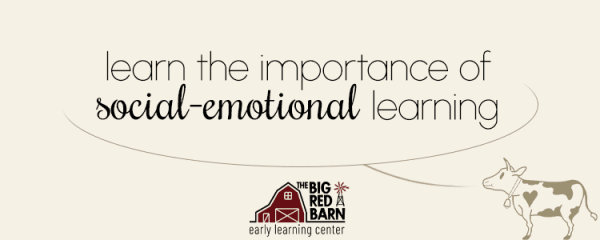The Importance of Social-Emotional Learning For Kids

A well-rounded education is at the heart of any child's learning journey. Letters, numbers, colors and all make up the foundations of any bright mind, as any early childhood educator can tell you — but modern early learning curriculums go beyond book smarts! How a child learns to interact with their peers, process their emotions, and handle new experiences are all key factors in the early development process, and all those factors are taught and refined through modern social-emotional learning programs!
Social-emotional learning is a relatively new phrase in early childhood education. If you're a new parent of an infant, toddler or preschooler, you may well not be familiar with the term or what it entails — and that's perfectly okay! To help introduce you to this newer branch of early learning, we'll walk you through what social emotional learning is, why it's important, and how we teach it here at The Big Red Barn.
What is Social Emotional Learning?
Social-emotional learning is a process through which individuals, namely children, develop their self-control, self-moderating, and interpersonal skills and strategies. Just like letters, numbers, and colors are the building blocks of a strong knowledge base, social emotional learning makes up the building blocks of healthy interpersonal interactions, good habits, and positive self-expression.
Where before, social-emotional learning was largely allowed to happen passively and independently in children, many modern preschool programs place a strong emphasis on it. This emphasis helps ensure that all children gain the social and emotional processing experience that they need in order to one day become their best, most in-tune selves! We at The Big Red Barn are proponents of social-emotional learning in young children, and as such we've incorporated it into our program— here is why we believe it's an important subject matter for all young children to learn.
Why is Social Emotional Learning Important?
In short, social-emotional learning is how your child will gain the core skills necessary to one day take on the world.
It all starts from within, as learners will get in touch with their newfound emotional capabilities. As any parent knows, a child's emotions often get the better of them, due in large part to a lack of experience dealing with them in a healthy, constructive way. This is the 'emotional' tenant of social-emotional learning, giving children the skills, strategies, and hands-on experience necessary to tackle problems associated with their emotions. It's here where children learn self-moderation and self-control, two critical skills that will be all but mandatory for healthy development later on in life.
And as learners get in touch with their emotions, they also get in touch with those around them. A love for talking comes naturally to a lot of kids, but conducting that talking in a consistently productive and constructive way requires practice and social learning. The social aspect of social-emotional learning teaches young kids how to interact with their peers, adults, and others in a respectful and appropriate way. In this way, children will have a much easier time finding their friends, feeling welcome and at ease at school and in social situations, and will be better equipped to do both of those things (and more!) better and better as they grow older.
To put it another way, good social-emotional learning helps put kids on the right path toward social and emotional maturity going into elementary school and beyond. Social-emotional learning is one of our core tenants at The Big Red Barn, and we'd love to show you how we incorporate it into our curriculum every day!
Social Emotional Learning at The Big Red Barn
At the Barn, our core curriculum package, known as Frog Street, has social-emotional learning as one of its four main areas of focus. In tandem with a focus on early brain development, intentional instruction, and developmental learning, Frog Street seamlessly integrates social-emotional learning into a broader early childhood learning experience. As your child learns letters, numbers and colors, they learn how to express themselves in healthy ways and how to better interact with their fellow kids! We believe Frog Street is the best curriculum for both "book smarts" and early social and cognitive development.
If you would like to know more about our curriculum in general, please click here, or if you'd like to learn more about our academy, please click here.
